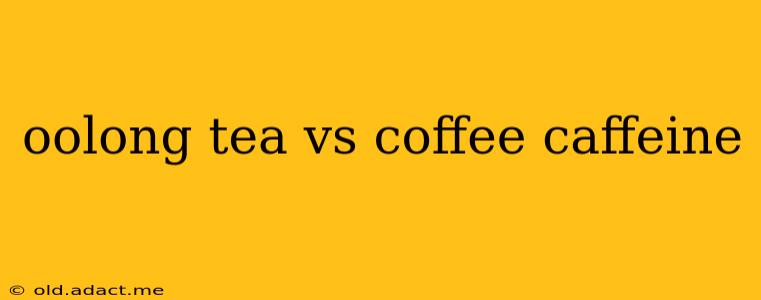Coffee and oolong tea are both popular beverages enjoyed worldwide for their stimulating effects, primarily attributed to their caffeine content. But which one packs a stronger caffeine punch, and what other differences should you consider? This in-depth comparison will settle the debate once and for all.
How Much Caffeine is in Oolong Tea vs. Coffee?
The caffeine content in both oolong tea and coffee is highly variable, depending on several factors. Let's break down the key influences:
-
For Coffee: The type of bean (Arabica vs. Robusta), roast level, brewing method, and bean-to-water ratio all significantly affect the final caffeine concentration. Generally, a standard 8-ounce cup of brewed coffee contains between 80 and 150 milligrams (mg) of caffeine. Espresso typically has a higher concentration.
-
For Oolong Tea: The oxidation level of the tea leaves (which determines the type of oolong), brewing time, water temperature, and the amount of tea leaves used all play a role. A typical 8-ounce cup of oolong tea contains between 25 and 50 mg of caffeine. However, some highly oxidized oolong teas can approach the lower end of the coffee range.
In short: Coffee generally contains significantly more caffeine than oolong tea.
What are the Different Types of Oolong Tea and How Does it Affect Caffeine Content?
Oolong tea boasts a wide spectrum of oxidation levels, influencing its flavor profile and caffeine content. Lightly oxidized oolongs, often resembling green tea, tend to have slightly higher caffeine levels than their more heavily oxidized counterparts, which can be more similar to black tea in both flavor and caffeine content. This makes it impossible to give a single number for oolong tea caffeine; it's highly dependent on the specific type.
Is Oolong Tea Healthier Than Coffee?
Both oolong tea and coffee offer potential health benefits, but the "healthier" option depends on individual needs and preferences.
Coffee's potential benefits: Studies suggest that coffee can improve cognitive function, boost metabolism, and reduce the risk of certain diseases, including type 2 diabetes and some cancers. However, excessive consumption can lead to anxiety, insomnia, and digestive issues.
Oolong Tea's potential benefits: Oolong tea is rich in antioxidants, which are believed to protect cells from damage. It's also associated with potential benefits for heart health, weight management, and improved gut health. Like coffee, excessive consumption might cause digestive upset in sensitive individuals.
Ultimately, both beverages can be part of a healthy lifestyle in moderation.
Does Oolong Tea Have Less Caffeine Than Coffee?
Yes, generally speaking, oolong tea has considerably less caffeine than coffee. However, this isn't a hard and fast rule, as the caffeine content of both beverages varies widely depending on the factors mentioned earlier.
Which Drink is Better for Energy?
While coffee's higher caffeine content provides a more immediate and potent energy boost, the gentler caffeine release from oolong tea often provides sustained energy without the jitters or subsequent crash some experience with coffee. The best choice depends on individual tolerance and desired energy profile.
Conclusion: Choosing Between Oolong Tea and Coffee
The choice between oolong tea and coffee comes down to personal preference and individual needs. If you need a strong and immediate energy boost, coffee might be the better option. If you prefer a smoother, more sustained energy lift with potential health benefits, oolong tea could be a preferable choice. Remember to consider factors like caffeine sensitivity and overall health goals when making your decision.
